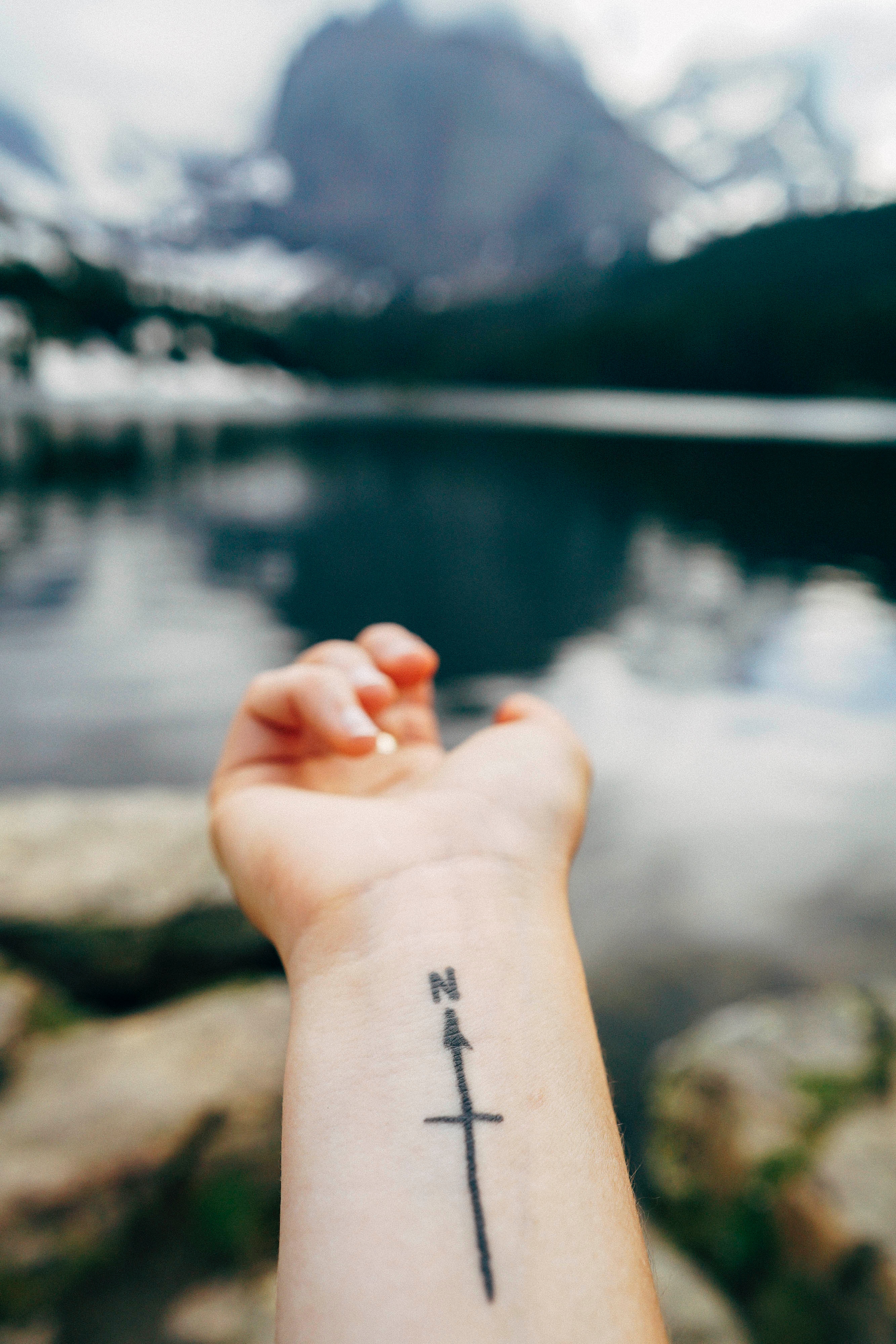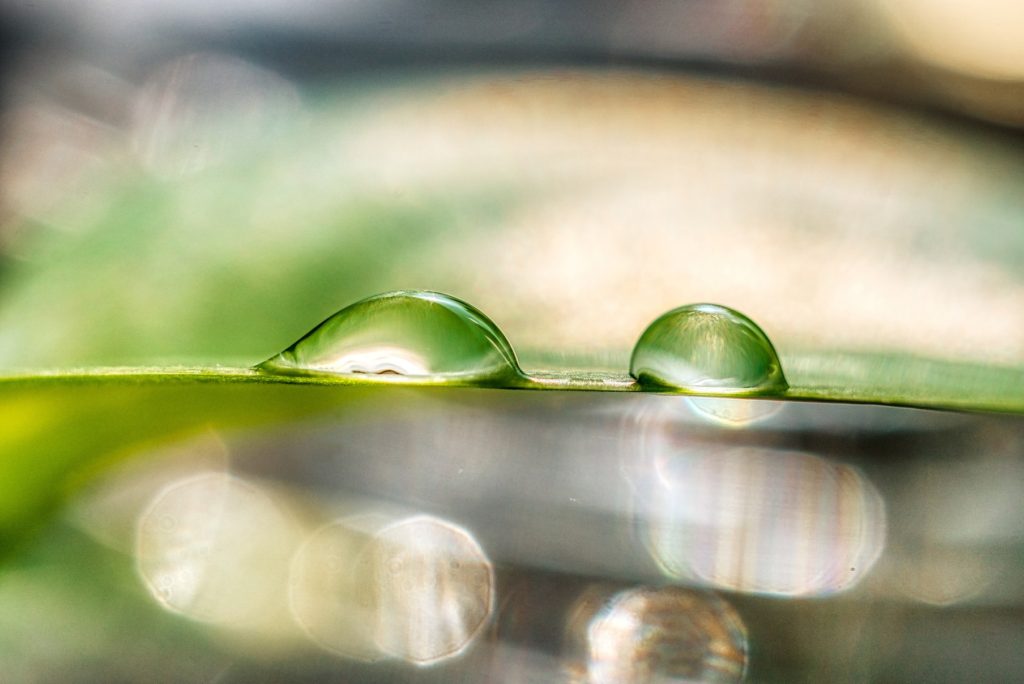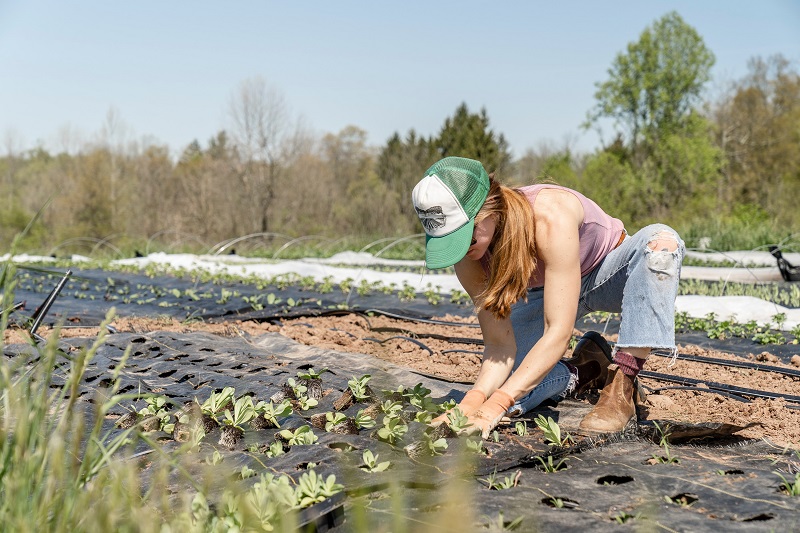Being alive blows me away. Every so often I’m gobsmacked anew by the miracle I am, and that you are. Animate, conscious meat sacks—bundles of aggregated Earth elements, able to sing and dance and tell stories. Able to learn. To remember.
Able to love. And to hate.
How crazy is this?!
This being alive thing is astounding! Awesome! Amazing! Wild!
I’m also able to know one day I’ll end. This self-aware, cohered dust that is me will return to the Earth from which I sprang. The miracle that is me will cease to exist in this form. This is, of course, true for every Earthling entity. I’m not special.
My friends in their 80s laugh at me—but I do fear aging and death. The other side of this amazing being alive thing is this amazing dying thing. I’ve already outlived both parents. I’ll be 80 myself in fifteen years.
I know how fast fifteen years goes. It’s not long.
Jed’s impending retirement has made this life of mine feel all the more urgent. For 50 years, I’ve been thinking someday I’ll get around to that. And next time I’ll do it different. Better. Somedays and next times are dwindling fast. I don’t have many do-overs left.
I want to live MY life, the life I’m meant to live. The life I choose for myself, not the one I’ve been trained to live. The life where I follow others’ rules and measure myself by others’ standards is a safe life. Safe, easy, and painful.
Now I see. This is what Lent is for: to examine my choices and conform them more fully to my values. So I won’t have regrets on my death bed. I want the Earthlings I love to know without an iota of doubt that I love them, through and through.
This revelation is nothing new, it turns out. Tradition and Mary Oliver have gotten here first.
Of course Lent is about mortality, says my husband when I share my revelation. He tells me Frederick Buechner said that Lent is for the big questions. Seven weeks to take meaning and mortality seriously.
And, of course also Mary Oliver, who asked What does it mean that Earth is so beautiful? And what shall I do about it? What is the gift that I should bring to the world? What is the life that I should live?
Living my life my way requires both going rogue and returning home. Following the direction of my heart will create more external conflict, as I bump up against established patterns and others’ preferences and expectations. Following my heart’s direction also means more internal peace, as the gap between my values and my choices narrows.
That gap hurts. That gap sucks energy. That gap is where I lose myself.
I want to close that gap. I want to recommit to myself and my priorities. Living in integrity with myself is self-ish. It’s also necessary, despite all the training to the contrary.
My integrity is my birthright.
Your integrity is your birthright.
Our integrity is our home.
PS. My newsletter is where I share my latest writing, news, and offerings. If you want to subscribe, you can do that here, and thank you!
[Photo: Natalie Rhea Rigg on Unsplash]
Tag Archives: Mary Oliver
Two poems for wilderness wanderers.
We began our most recent Community Conversation with Lectio Divina, using the first lines of Mary Oliver’s Wild Geese. We laughed, we cried, we shared. One community member contributed David Whyte’s lovely poem to our conversation. l am deeply grateful to you all.
Both poems are potential resources for you who find yourselves walking in a spiritual wilderness. They speak to the loneliness of wandering and the joy of finding home again. And perhaps to the realization that home was there all along. Perhaps even to the realization that the wilderness is home.
Mark your calendars for our next gathering: Thursday, September 30th, at 9:00 am Pacific. We’d love to have you join us. Subscribe here for weekly-ish resources, including links to Community Conversations.
Wild Geese
You do not have to be good.
You do not have to walk on your knees
for a hundred miles through the desert, repenting.
You only have to let the soft animal of your body
love what it loves.
Tell me about despair, yours, and I will tell you mine.
Meanwhile the world goes on.
Meanwhile the sun and the clear pebbles of the rain
are moving across the landscapes,
over the prairies and the deep trees,
the mountains and the rivers.
Meanwhile the wild geese, high in the clean blue air,
are heading home again.
Whoever you are, no matter how lonely,
the world offers itself to your imagination,
calls to you like the wild geese, harsh and exciting—
over and over announcing your place
in the family of things.~Mary Oliver
The Well
Be thankful now for having arrived,
for the sense of
having drunk
from a well,
for remembering the long drought that preceded your arrival
and the years walking in a desert landscape of surfaces looking for a spring hidden from you for so long that even wanting to find it now had gone from your mind
until you only
remembered the hard pilgrimage that brought you here,
the thirst that caught in your throat; the taste of a world just-missed
and the dry throat that came from a love you remembered but had never fully wanted for yourself, until finally, after years making the long trek to get here it was as if your whole achievement had become nothing but thirst itself.
But the miracle had come simply from allowing yourself to know that you had found it,
that this time
someone walking out into the clear air from far inside you
had decided not to walk past it anymore;
the miracle had come at the roadside in the kneeling to drink
and the prayer you said,
and the tears you shed
and the memory
you held
and the realization
that in this silence
you no longer had to keep your eyes and ears averted from the
place that
could save you,
that you had been given
the strength to let go
of the thirsty dust laden
pilgrim-self
that brought you here,
walking with her
bent back, her bowed head and her careful explanations.
No, the miracle had already happened
when you stood up,
shook off the dust
and walked along the road from the well,
out of the desert toward the mountain,
as if already home again, as if you
deserved what you loved all along,
as if just remembering the taste of that clear cool spring could lift up your face
and set you free.~David Whyte
Photo by Thomas Kinto on Unsplash
Practice Resurrection: 3 poems
Resurrection is a discipline. We live in a Good Friday world – patriarchal, consumerist, capitalist, colonialist. This world needs our Easter selves – hopeful, irrational, bursting out of the tomb, aspiring to love and kindness. Here are three poems to support you in your practice of resurrection.
Very little grows on jagged rock. Be ground. Be crumbled, so wildflowers will come up where you are. You’ve been stony for too many years. Try something different. Surrender.
Rumi, translated by Coleman Barks
Let grief be your sister, she will whether or no.
Rise up from the stump of sorrow, and be green also, like the diligent leaves.
A lifetime isn’t long enough for the beauty of this world and the responsibilities of your life.
Scatter your flowers over the graves, and walk away.
Be good-natured and untidy in your exuberance.
Mary Oliver, from The Leaf and the Cloud
When your eyes are tired the world is tired also.
When your vision has gone no part of the world can find you.
Time to go into the dark where the night has eyes to recognize its own.
There you can be sure you are not beyond love.
The dark will be your womb tonight.
The night will give you a horizon further than you can see.
You must learn one thing. The world was made to be free in.
Give up all the other worlds except the one to which you belong.
Sometimes it takes darkness and the sweet confinement of your aloneness
to learn anything or anyone
who does not bring you alive
is too small for you.
David Whyte from The House of Belonging
Photo by Zoe Schaeffer on Unsplash
How to feel joy.
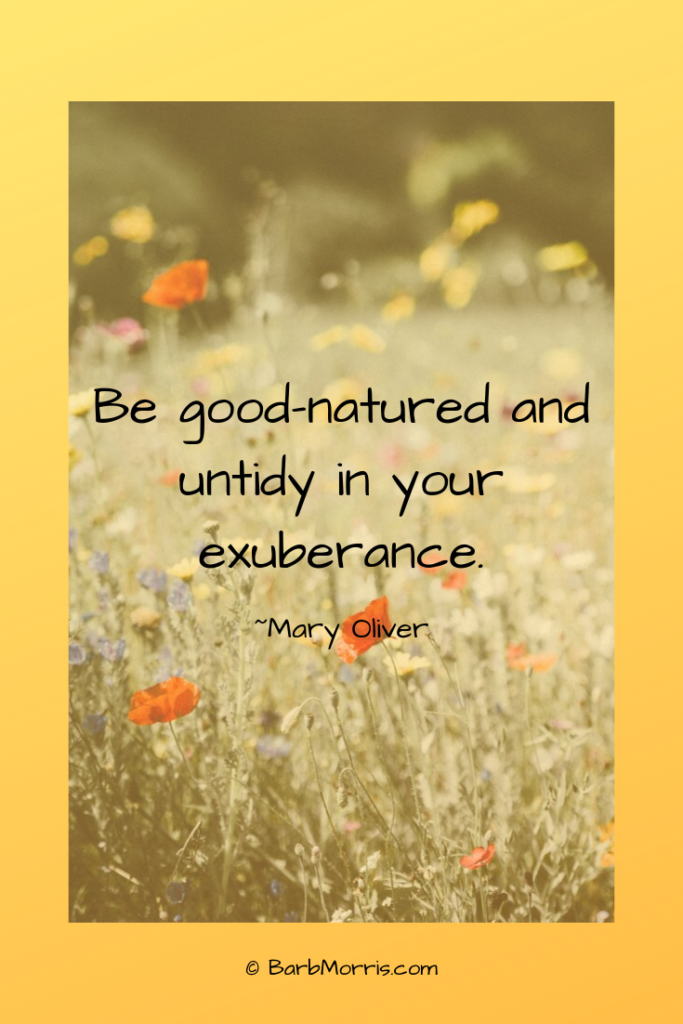
This is the piece I was ready to post last week. And then “A letter from God to her daughters who resist joy” showed up and wanted to be shared instead. Here’s my more cerebral, left-brain answer to the question, “Why do we resist joy?”
Two weeks ago I wrote about how to feel sad, and I heard from a few of you who were grateful for the encouragement and instruction. Today I want to encourage us to feel our joy.
Joy. Why would we resist feeling joyful and happy? It seems like a no-brainer, doesn’t it? Pushing away sadness makes sense. Sadness, grief, sorrow – they hurt. Joy doesn’t hurt, right?
Well. Maybe, maybe not. We might not resist joy like we resist sadness. We resist joy in different ways – we might rush past joy, not stopping to take it in. We might hold on to it with a death grip, grasping and needy, not trusting that there are moments of joy yet to come.
We might believe that if we let joy in, it will only make our inevitable sorrow more acutely painful.
And we’d be right.
Your joy is your sorrow unmasked.
And the selfsame well from which your laughter rises was oftentimes filled with your tears.
And how else can it be?
The deeper that sorrow carves into your being, the more joy you can contain.
Is not the cup that holds your wine the very cup that was burned in the potter’s oven?
And is not the lute that soothes your spirit, the very wood that was hollowed with knives?
When you are joyous, look deep into your heart and you shall find it is only that which has given you sorrow that is giving you joy.
When you are sorrowful look again in your heart, and you shall see that in truth you are weeping for that which has been your delight.
Some of you say, “Joy is greater than sorrow,” and others say, “Nay, sorrow is the greater.”
But I say unto you, they are inseparable.
Together they come, and when one sits alone with you at your board, remember that the other is asleep upon your bed.
Kahlil Gibran
Feelings are unpredictable. Feelings ebb and flow. Feelings arrive, fresh-faced or tear-stained, without words, yanking on our skirts and distracting us from our to-do lists. They require our attention at inconvenient times.
Feeling our feelings, all of them, is a choice. We don’t have to do it. We can numb and distract and talk ourselves out of our feelings until we die. Many lovely people choose not to feel their feelings. You probably know a few of them.
Our dominant culture excels at teaching us to ignore our true feelings.
So, why bother? Why feel at all? Why rock our little human boats that we try so hard to keep afloat and on an even keel? Why make life harder than it already is? Why choose to feel deeply? Why not leave well enough alone?
Why choose to get back in touch with our emotions? Our emotions live in our bodies. When we cut off our emotional lives, we cut off our embodied existence. We live from the neck up, dragging our bodies around like machines controlled by our brains.
You may have vacated your body and moved into your head at some point, probably in self-defense. It was the best strategy at the time. Vacating your body was how you got through the painful stuff.
If so, it’s time to come back home.
Why? Because, when you cut off your embodied feelings, you also cut off your connection to Soul. Our souls and bodies are intertwined. Your soul does not live in your brain or your mind.
Feeling your joy and sorrow is how you reconnect with your body. Reconnecting with your body is how you connect with your soul and your soul’s Source.
Cutting off your body because it hurts too much and you feel uncomfortable is to cut off your connection to God. Refusing to be in our bodies severs our connection to Holiness. Your holiness. My holiness. Earth’s holiness. Holiness Itself.
Besides, it takes so much energy to keep stuffing and resisting our feelings! Just think what you could get done if you just let your feelings move through you and got on with your day?!
If you want a less woo-woo, more sciency reason to feel your feelings, consider the neurobiology adage “Neurons that fire together, wire together.” In the words of Rick Hanson, “Passing mental states become lasting neural traits.” He’s got some good instructions in this 13-minute TED talk.
When we pay conscious attention to joyful moments, experiences, and memories, we heal our brains. A healed brain is more resilient and flexible. A healed brain is more resistant to stress and the cascade of destruction and disease caused by stress.
We inhabit our joy only when we also attend to our sorrow. They walk together.
Mary Oliver:
When loneliness comes stalking, go into the fields, consider
the orderliness of the world. Notice
something you have never noticed before,
like the tambourine sound of the snow cricket
whose pale green body is no longer than your thumb.
Stare hard at the hummingbird, in the summer rain,
shaking the water-sparks from its wings.
Let grief be your sister, she will whether or no.
Rise up from the stump of sorrow, and be green also,
like the diligent leaves.
A lifetime isn’t long enough for the beauty of this world
and the responsibilities of your life.
Scatter your flowers over the graves, and walk away.
Be good-natured and untidy in your exuberance.
Does this resonate? Want to explore further? Contact me to schedule a free no-obligation conversation. I’d love to talk!
Photo credit: Annie Spratt on Unsplash
Let’s Stop Comparing Ourselves to Trees.
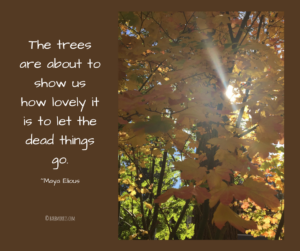 It’s fall in the Northern Hemisphere.
It’s fall in the Northern Hemisphere.
You know what that means, right?
Yup, pumpkin spiced everything.
And also blog post after blog post about letting go. Relaxing into the dark. Transformation. Transition. Change. About how we should be like trees and gracefully let the dead things fall away.
I’ve been guilty of it myself. (See header image.)
And yet. We’re not trees.
Please stop comparing yourself to a tree.
Humans and trees diverged very early in life’s evolutionary journey. Humans went on to evolve a large brain, with a cerebral cortex that knows it’s housed in a body that will die, and so the mind fears. A lot.
Maybe trees have fears, too, when fall comes and they feel their dead leaves drop away. Maybe they resist, too, just like we do.
I’ve been exploring ways to navigate transitions more kindly. My kids are self-sufficient adults, so I’m transitioning from active parenting to empty nester. I’m actively exploring nature-based spirituality, so I’m transitioning from Episcopalian to who knows what. I’m an entrepreneur, so I’m transitioning from fitting into a defined job to being in charge of my own work. My body continues to age, so I’m transitioning from young-ish woman to juicy crone.
Dying and rising and doing it all over again comes pre-installed in Earthlings. All Earthlings. Trees. Rocks. Water. Ravens. Humans. Change is not optional.
I’m finding that knowing who I am, having a sense of my core identity, the essence of “me,” is helpful. Knowing and staying in touch with my heart is one key to sane cycling and changing.
Just as a tree’s identity remains when it stands bare to the winter winds, I will still be “me” when outer identitifiers (mom, teacher, Christian, young …) fall away.
My heart identity lives in my body. It makes sense to me, then, that deeply knowing myself and living from my core starts with loving and paying attention to my body.
Who you are lives in your body. Deeply knowing yourself and living from your core starts with loving and paying attention to your body, in whatever form that takes for you. I suggest regular body scans, baths, movement, sweaty work, long walks – whatever feels delicious. “Let the soft animal of your body love what it loves.” (Mary Oliver)
Be warned, though. Your body is wild. Paying attention to your body means feeling your feelings. It means sitting with your pain and your joy. Giving yourself the gift of self-compassion.
We are not trees. For humans, with these brains that scream fears night and day, it helps so much to know and trust our hearts. To know that our bodies tell the truth, while our minds often don’t.
When we know who we are, the stuff we cling to that isn’t ours anymore, perhaps never was ours, can fall away like last year’s leaves.
(Would you like to explore navigating the changes and seasons of your life with kindness? I offer a free discovery call. Click here for details.)

